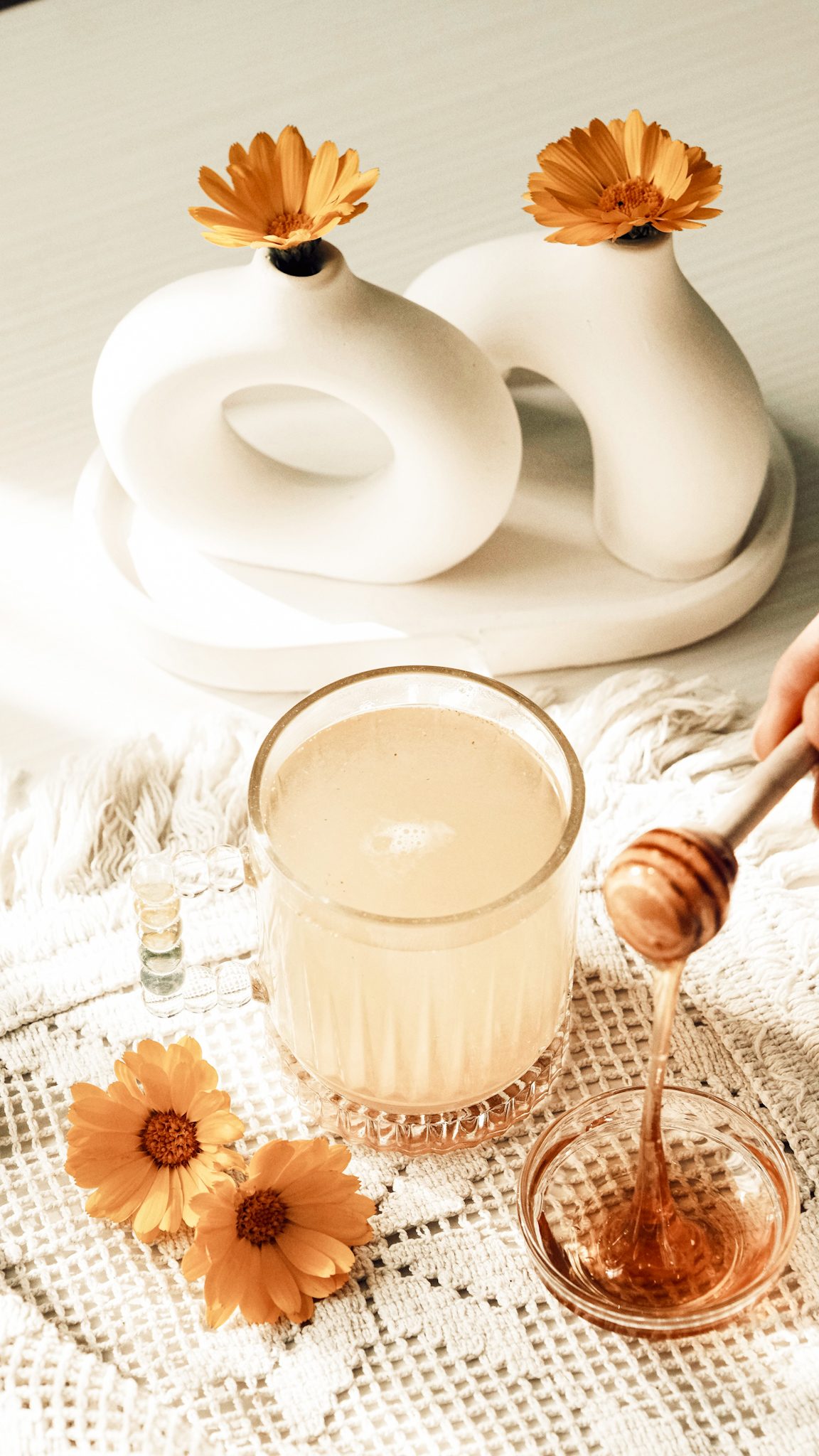Cough Remedies for Adults: What Actually Works

This post may contain affiliate links, which means I may earn a small commission if you make a purchase through these links — at no extra cost to you. Thank you for supporting the content I create here on the blog! You can read my full Disclosure Policy for more details.
In this article
Because no one wants to be that person coughing through every meeting.
You know the cough I’m talking about — the kind that starts as a tickle and somehow takes up permanent residence in your chest. It shows up during Zoom calls, at dinner, or right when you’re finally drifting off to sleep.
The truth is, most coughs aren’t dangerous — but they can be draining, especially when they linger for weeks. Whether it’s from a seasonal cold, dry indoor air, or leftover irritation after being sick, you deserve to feel better.
In this guide, we’ll talk about what actually helps adults get relief from a cough — the tried-and-true home remedies, the best over-the-counter (OTC) treatments, and the natural, herbal options that blend traditional wisdom with modern science.
Understanding Your Cough: Why It Happens
A cough isn’t your enemy — it’s your body’s way of clearing your airways. But not all coughs are created equal.
1. Dry Cough:
A dry or tickly cough usually happens when your throat or upper airways are irritated. Common causes include post-nasal drip, allergies, acid reflux, or simply breathing in dry air.
2. Wet (Productive) Cough:
This is when your body is trying to expel mucus or phlegm — often after a cold or respiratory infection. You might hear crackling sounds in your chest or feel mucus when you breathe deeply.
3. Chronic or Persistent Cough:
If it’s been more than three weeks, it could be related to something deeper, like asthma, acid reflux (GERD), or a lingering infection.
When to see a doctor: If your cough comes with fever, chest pain, shortness of breath, or blood in your mucus, don’t ignore it. A quick check-in can rule out serious conditions.
Home Remedies That Actually Work
There’s a reason your grandmother swore by certain remedies — some of them genuinely work, and science agrees.
1. Honey-Lemon Elixir
Honey is nature’s cough syrup. It coats your throat, reduces irritation, and can even calm the cough reflex. Lemon adds a vitamin C boost and helps thin mucus.
How to make it:
Mix 1 tablespoon of raw honey (Manuka or local honey is ideal) with the juice of half a lemon in a cup of warm water or herbal tea. Sip slowly, especially before bed.
2. Ginger & Turmeric Tea
Both are natural anti-inflammatories that calm irritated airways and support your immune system.
How to make it:
Slice a few pieces of fresh ginger root, add ¼ teaspoon of turmeric, and steep in hot water for 10–15 minutes. Add honey if desired.
Why it helps: Ginger can relax airway muscles, while turmeric’s curcumin compound fights inflammation. Together, they’re powerhouse ingredients for soothing a persistent cough.
3. Steam Therapy & Humidifiers
Dry air is one of the biggest culprits for lingering coughs — especially during winter heating season. Steam adds moisture back into your airways and loosens congestion.
Try this:
- Take a steamy shower and breathe deeply for 5–10 minutes.
- Or fill a bowl with hot water, place a towel over your head, and inhale slowly (add a drop of eucalyptus oil for extra relief).
- Keep a cool mist humidifier in your bedroom to prevent your throat from drying out overnight.
4. Saltwater Gargle
Simple but surprisingly powerful. Salt helps reduce swelling and draw out mucus from the throat.
How to do it: Dissolve ½ teaspoon of salt in a glass of warm water and gargle for 20–30 seconds. Repeat two to three times a day.
5. Rest & Hydration
Your immune system works best when you’re well-rested. Fatigue and dehydration make it harder for your body to heal.
- Drink plenty of fluids: water, broths, and caffeine-free teas.
- Avoid alcohol and excessive caffeine, which dehydrate you.
- Aim for 7–9 hours of sleep — your body does most of its repair work at night.
Over-the-Counter (OTC) Remedies That Work
If home remedies don’t cut it, there’s no shame in using OTC help. The key is knowing what to reach for.
1. Expectorants
If you have a wet cough with mucus, expectorants help loosen it so you can cough it up more easily.
Popular choice: Mucinex (guaifenesin) — it thins mucus without making you drowsy.
2. Cough Suppressants
For dry, hacking coughs that keep you awake, suppressants calm the cough reflex.
Popular choice: Delsym (dextromethorphan) — offers up to 12 hours of relief.
3. Lozenges & Sprays
These don’t cure a cough but provide on-the-go relief. Look for honey, menthol, or zinc lozenges, and avoid ones with too much added sugar.
Note: Always read the labels — some formulas can interact with other meds or raise blood pressure.
Herbal & Natural Alternatives
If you prefer a natural route, there are several botanicals that can help calm the cough reflex and support healing.
1. Elderberry Syrup
Rich in antioxidants and immune-supporting compounds, elderberry can help shorten the duration of cold-related coughs. Look for sugar-free, organic options.
2. Eucalyptus Oil
Eucalyptus is a natural decongestant. Add a few drops to your diffuser or inhale it during a steamy shower. It helps clear mucus and open up airways.
3. Marshmallow Root Tea
Marshmallow root contains mucilage, a soothing gel-like substance that coats and protects irritated throat tissue.
4. Thyme & Peppermint Tea
Thyme relaxes the throat muscles, and peppermint’s menthol helps open nasal passages. Together, they make a lovely evening tea.
Lifestyle Shifts That Make a Big Difference
A few small changes can prevent your cough from getting worse — or coming back.
- Add humidity: Keep the air around 40–50% humidity. Too dry or too moist can irritate your lungs.
- Avoid irritants: Smoke, perfume, cleaning sprays, and even scented candles can worsen coughing fits.
- Boost immunity: Eat colorful foods, stay hydrated, and consider vitamin C, D, and zinc supplements.
- Prop yourself up: Sleeping on an extra pillow can reduce nighttime coughing caused by post-nasal drip or acid reflux.
- Clean your air: Use an air purifier if you live in a city or have pets.
When to See a Doctor
Sometimes, a cough is your body’s signal that something deeper is going on.
Seek medical help if you experience:
- A cough lasting longer than 3 weeks
- High fever, chills, or night sweats
- Chest pain or difficulty breathing
- Wheezing, especially if you have asthma
- Blood in phlegm
- A history of heart or lung conditions
Trust your instincts — it’s always better to rule out serious issues early.
Your Cough Relief Toolkit
If you want to stock your medicine cabinet (or wellness shelf) with everything you need to soothe your next cough naturally, here’s a simple starter list:
- Raw honey (for tea, soothing, and natural cough syrup)
- Ginger & turmeric (for anti-inflammatory teas)
- Humidifier or diffuser (for adding moisture and using essential oils)
- Herbal teas (peppermint, thyme, marshmallow root)
- Elderberry syrup (for immune support)
- OTC backup (like Mucinex or Delsym for tough days)
FAQs: Cough Remedies for Adults
What is the fastest way to stop coughing at night?
The quickest fix is to soothe your throat and humidify your air. Sip warm honey-lemon tea before bed, run a cool-mist humidifier, and keep your head slightly elevated. If it’s a dry cough, a spoonful of honey or a cough suppressant like Delsym can help calm the reflex so you can sleep.
What naturally helps a cough go away?
Natural cough relief often starts in your kitchen. Honey, ginger, turmeric, and steam are all proven to ease irritation and clear airways. Staying hydrated, resting well, and avoiding smoke or strong scents also speed up healing.
What’s the best cough medicine for adults?
It depends on your cough type. For a wet cough, try an expectorant like Mucinex to loosen mucus. For a dry cough, go with a suppressant such as Delsym or Robitussin DM. Always read labels and follow dosing instructions.
How do I get rid of a cough from a cold fast?
Combine rest, hydration, and gentle remedies. Drink warm fluids, use steam inhalation, and take an OTC expectorant if mucus is present. Most coughs from a cold improve within 7–10 days with consistent care.
What is the best home remedy for a persistent cough?
Try raw honey mixed with warm water and lemon juice — it soothes your throat and reduces coughing fits. Adding ginger or turmeric tea and keeping your room humidified can also make a big difference over time.
When should I worry about a cough?
If your cough lasts more than three weeks, brings up blood, or comes with fever, wheezing, or chest pain, it’s time to call your doctor. Persistent coughing can sometimes signal asthma, reflux, or infection.
Can allergies cause a cough?
Absolutely. Post-nasal drip from allergies often triggers a dry, tickly cough. Treating the underlying allergies — with antihistamines, air purifiers, and avoiding triggers — can help calm it down quickly.
What foods help stop coughing?
Focus on warm, soothing foods: soups, herbal teas, and honey-based drinks. Avoid cold, sugary, or dairy-heavy foods, which can thicken mucus or irritate your throat. Garlic, ginger, and citrus fruits may also help support your immune system.

